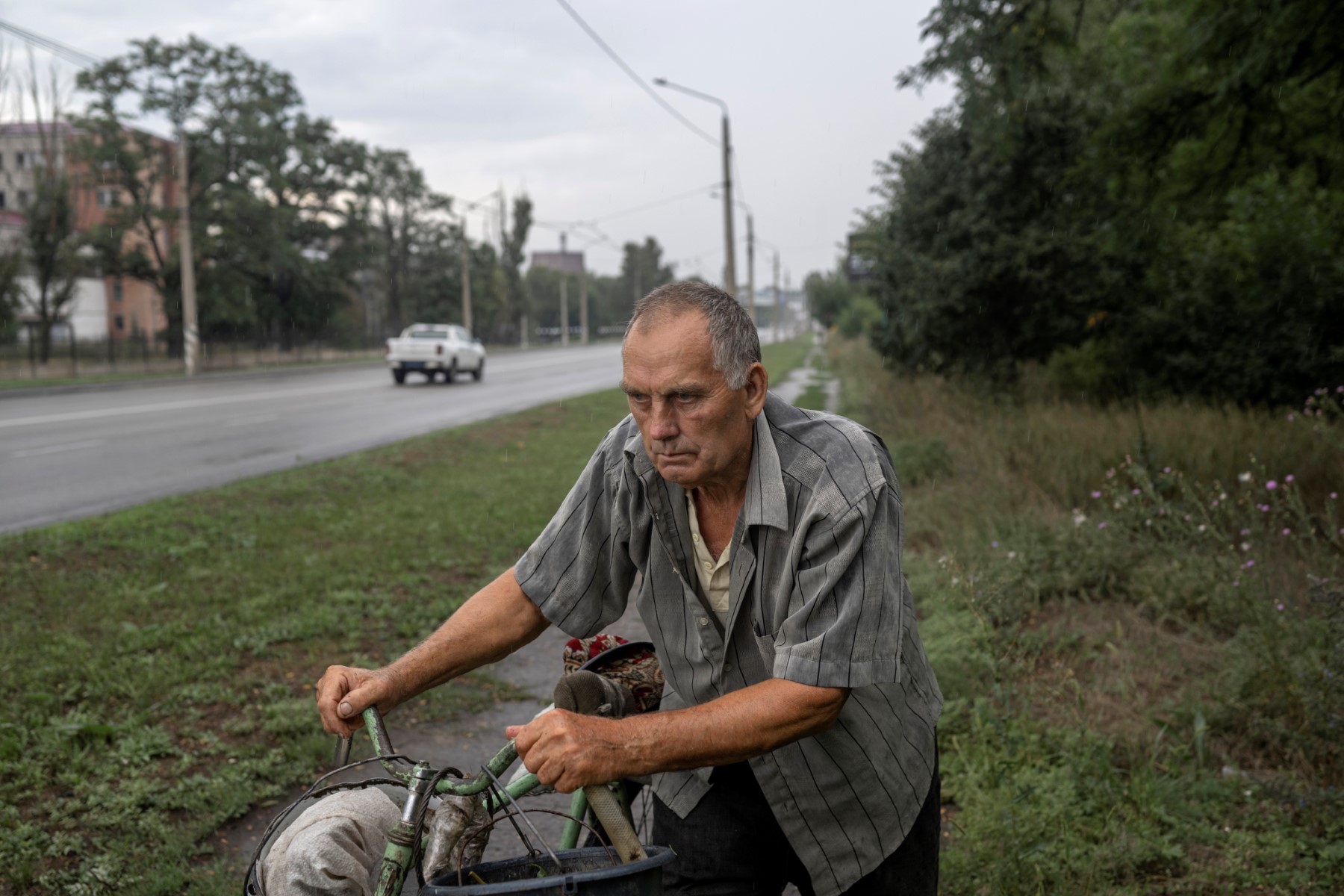‘If I am shot, who cares?’: Ukraine’s elderly bikers defy cycle of violence
They look incongruous, but they are everywhere across Ukraine’s embattled eastern Donbas region – elderly cyclists, trundling back and forth on battered push bikes, refusing to be fazed by the chaos around them. Barbaric artillery may rain down on the horizon and armoured trucks tear through the streets, but the senior bikers refuse to flee, […]

A Ukrainian man holds his bicycle as he goes back home in Kramatorsk on August 4, 2022, amid the Russian invasion of Ukraine. (Photo by Bulent KILIC / AFP)
They look incongruous, but they are everywhere across Ukraine’s embattled eastern Donbas region – elderly cyclists, trundling back and forth on battered push bikes, refusing to be fazed by the chaos around them.
Barbaric artillery may rain down on the horizon and armoured trucks tear through the streets, but the senior bikers refuse to flee, projecting a strange sense of normality in the devastated warscape.
- Vacant Senate seats: INEC dilly-dallies on by-elections, 4 months after Adamu, Kyari, Nasiha’s resignation
- Dilemma of Kaduna community caught between Ansaru, bandit hostilities
In the suburbs of Kyiv abandoned by occupying Russian forces in the spring, AFP found numerous bodies of cyclists, seemingly gunned down as they insisted on keeping a normal rhythm of life in perilous circumstances.
“Nothing has hit me so far,” grins 77-year-old cyclist, Otari Iunashvili, in the city of Toretsk, his mouth glinting with gold and silver teeth under a bulbous grey moustache.
On Thursday, eight people were slain by a Russian airstrike at a bus stop in Toretsk, according to the regional governor. During the night, a strip of shops was savaged by another blast, according to locals at the scene.
In the morning, a mechanical digger shunts rubble and broken brickwork under a blanket of masonry dust. A cleanup crew sweeps walkways, while incoming and outgoing artillery duel in the distance.
The cyclists lean on their handlebars, casually watching the proceedings even as cars speed out of the city with parcels of belongings strapped on their roofs.
“I have no vehicle to drive and I still need to get around,” shrugs 60-year-old retired mine worker Oleksandr, clutching the maroon paint-chipped handlebars of a brakeless ladies’ bike.
“I feel the danger, of course,” he admits. “But if I am shot, then who cares?”
Since Moscow called off its assault on Kyiv at the end of March, the war has refocused on the east and south-east of Ukraine, where the Russian military has been active and backing pro-Kremlin insurgents since 2014.
In the eastern Donbas region – Ukraine’s industrial heartland comprising the Donetsk and Luhansk areas – the battle has become an artillery slugging match with territorial gains and losses made in gruelling slow motion.
Cities, towns and villages are now pockmarked with the ageing, unhealed scars of artillery strikes. Buildings are boarded up and fortified with leaking sandbags, seeming long-abandoned to the battleground.
Last week, Ukrainian President, Volodymyr Zelensky, ordered the mandatory evacuation of the Donetsk region, saying “the sooner it is done… the fewer people the Russian army will have time to kill”.
But Ukraine estimates there are still hundreds of thousands of civilians left in the eastern territories not yet occupied by Russia.
Among them are many of the elderly, often without the family ties or finance to find a new home elsewhere for an indeterminate time, with the war in its sixth month and no end in sight.
Some are just too stubborn to leave.
‘Cycling is healthy’
“Cycling is healthy and driving is stressful,” says 74-year-old Volodymyr, gathering fistfuls of grass on a motorway verge to feed his ducks and chickens at home.
He has parked his pistachio-green town bike further down the carriageway in the city of Kramatorsk, under a propaganda billboard of a Ukrainian soldier brandishing an anti-tank weapon.
“I feel fine,” he declares with edgy defiance when quizzed about his casual choice of transport through the largest war on European soil since World War II.
“I would prefer that if anything happens, I die immediately so I won’t be disabled after.”
The cyclist-pensioners of Donbas have been hardened into stoicism by eight years of conflict.
Viktor Alekseevich rolls his handsome 40-year-old bike – manufactured in Soviet Russia – along the pavement, his trousers tucked into his socks to prevent them being churned in the gears.
“Yes, I feel safe. Our troops are here,” declares the 62-year-old.
And if a missile lands? “I will hide in the bushes,” he says. (AFP)
